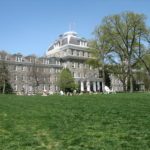D2 Schools in Florida: Which is Best for You?
What’s Covered:
NCAA Division 2 boasts teams from 47 states, including Alaska, Hawaii, and Washington, D.C. It even includes three teams from Puerto Rico. In total, D2 comprises 288 college athletic programs, 14 of which are located in the state of Florida. Looking to avoid the winter while pursuing sports competitively as a D2 athlete? Keep reading to learn about the D2 schools in Florida.
What is the NCAA Division 2?
Division 2 is one of three divisions of the National Collegiate Athletic Association (NCAA), a member-led organization focused on college athletics. The three divisions guarantee fairness and competitiveness for participating institutions by ensuring that schools within each division have athletes of similar ability levels and adhere to standards for scholarships and admissions.
Division 2 schools are typically mid-sized—the average enrollment of a D2 school is 2,500 students. That said, D2 schools can range from institutions with undergraduate populations of more than 25,000 to those with fewer than 2,500. D2 student-athletes are eligible for partial scholarships, and most fund their college education through a combination of athletic scholarships, academic aid, need-based grants, and/or employment earnings.
There are currently more than 120,000 student-athletes participating in D2 sports, and at D2 schools, roughly one in every ten students is an athlete.
D2 Colleges in Florida
Florida’s D2 schools range in terms of size and acceptance rate. Here’s the landscape at a high level:
|
School Name |
City |
Acceptance Rate |
|
Miami |
59% |
|
|
Saint Petersburg |
79% |
|
|
Jacksonville |
85% |
|
|
Daytona Beach |
62% |
|
|
Saint Augustine |
78% |
|
|
Melbourne |
63% |
|
|
Lakeland |
59% |
|
|
Boca Raton |
74% |
|
|
Fort Lauderdale |
73% |
|
|
West Palm Beach |
88% |
|
|
Winter Park |
41% |
|
|
Saint Leo |
72% |
|
|
Tampa |
41% |
|
|
Pensacola |
57% |
Barry University
Location: Miami, FL
Acceptance Rate: 59%
Undergraduate Enrollment: 3,150
Originally founded as a women’s college by a pair of Adrian Dominican Sisters, today Barry University is coeducational, but remains faithful to the Catholic intellectual tradition—integrating study, reflection, and action into intellectual life. The school is liberal arts-focused and emphasizes graduating well-rounded students prepared to affect positive change in the global community.
Barry University plays in the Sunshine State Conference and fields 21varsity teams:
Men’s
- Baseball
- Basketball
- Cross country
- Lacrosse
- Golf
- Soccer
- Swimming
- Outdoor track and field
- Tennis
- Volleyball
Women’s
- Basketball
- Beach volleyball
- Cross country
- Golf
- Lacrosse
- Rowing
- Soccer
- Softball
- Track and field, outdoor
- Tennis
- Volleyball
Eckerd College
Location: Saint Petersburg, FL
Acceptance Rate: 79%
Undergraduate Enrollment: 1,986
Founded in 1958, Eckerd College has developed an excellent academic reputation in its little over 60 years. The school is notable for its small class sizes and accessible and passionate faculty. At Eckerd, every student is paired with a faculty mentor. Of course, you can’t talk about Eckerd without mentioning its waterfront campus and white sand beach.
Eckerd College plays in the Sunshine State Conference and fields 16 varsity teams:
Men’s
- Baseball
- Basketball
- Cross country
- Golf
- Soccer
- Tennis
Women’s
- Basketball
- Beach volleyball
- Cross country
- Golf
- Sailing
- Soccer
- Softball
- Tennis
- Volleyball
Coed
- Open sailing
Edward Waters University
Location: Jacksonville, FL
Acceptance Rate: 85%
Undergraduate Enrollment: 1,113
Edward Waters University has the distinction of being Florida’s first institution established for the education of African Americans and the state’s first historically Black college (HBCU). The university dates back to the 1860s and is deeply rooted in Reconstruction.
Edward Waters University competes in the Southern Intercollegiate Athletic Conference and fields 16 varsity teams:
Men’s
- Baseball
- Basketball
- Cross country
- Football
- Indoor track and field
- Outdoor track and field
- Volleyball
Women’s
- Basketball
- Cross country
- Golf
- Indoor track and field
- Outdoor track and field
- Soccer
- Softball
- Tennis
- Volleyball
Edward Waters University is also home to three junior varsity teams:
- Men’s basketball
- Men’s baseball
- Women’s basketball
Embry-Riddle Aeronautical University
Location: Daytona Beach, FL
Acceptance Rate: 62%
Undergrad Enrollment: 10,274
Embry-Riddle Aeronautical University is the world’s largest and oldest aviation-focused university. The school is home to both the nation’s first (and only) undergraduate Space Physics program and undergraduate Aerospace Physiology program. The university also has 99 instructional aircraft split between its Daytona Beach and Prescott, Arizona campuses and is a Federal Aviation Administration-approved school.
Embry-Riddle Aeronautical University plays in the Sunshine State Conference and, along with coed cheerleading, fields 20 men’s and women’s varsity teams:
Men’s
- Baseball
- Basketball
- Cross country
- Golf
- Lacrosse
- Rowing
- Soccer
- Tennis
- Track and field
Women’s
- Basketball
- Cross country
- Golf
- Lacrosse
- Rowing
- Soccer
- Softball
- Tennis
- Track and field
- Volleyball
Coed
- Cheerleading
Flagler College
Location: Saint Augustine, FL
Acceptance Rate: 78%
Undergraduate Enrollment: 2,432
Founded just over 50 years ago in 1968, Flagler College is a liberal arts school steeped in history. Saint Augustine, home of Flagler College, has the distinction of being the oldest continuously occupied European settlement in the United States, and the college’s Ponce de Leon Hall (formerly Hotel Ponce de Leon) is listed as a National Historic Landmark and now serves as a residence hall for freshmen women.
Flagler College plays in the Peach Belt Conference and fields 17 varsity teams:
Men’s
- Baseball
- Basketball
- Cross country
- Golf
- Lacrosse
- Soccer
- Tennis
- Track and field
Women’s
- Basketball
- Cross country
- Golf
- Lacrosse
- Soccer
- Softball
- Tennis
- Track and field
- Volleyball
Florida Institute of Technology | Florida Tech
Location: Melbourne, FL
Acceptance Rate: 63%
Undergraduate Enrollment: 3,458
Known simply as Florida Tech, the school was founded by a physicist at Cape Canaveral (now NASA’s Kennedy Space Center) as a night school for the early “missilemen” of the U.S. space program. The school continues to honor its out-of-this-world roots, attracting students with an interest in science and technology—about half of the student body enrolls in the school’s College of Engineering and Science.
Florida Institute of Technology plays in the Sunshine State Conference and fields 15 men’s and women’s varsity teams:
Men’s
- Baseball
- Basketball
- Cross country
- Lacrosse
- Rowing
- Soccer
- Swimming
- Indoor track and field
- Outdoor track and field
Women’s
- Basketball
- Lacrosse
- Soccer
- Softball
- Swimming
- Volleyball
Florida Tech also fields esports, ice hockey, and women’s rowing club teams.
Florida Southern College
Location: Lakeland, FL
Acceptance Rate: 59%
Undergraduate Enrollment: 2,626
The sun (almost) always shines on Florida Southern College, with its hometown of Lakeland averaging 330 sunny days a year. Founded in 1883 as the South Florida Institute, Florida Southern College has the distinction of being the oldest private college in the state. The school is also notable for having the largest single-site collection of Frank Lloyd Wright architecture in the world—its Historic District is designated a National Historic Landmark.
Florida Southern College plays in the Sunshine State Conference and fields 22 varsity teams:
Men’s
- Baseball
- Basketball
- Cross country
- Golf
- Lacrosse
- Soccer
- Swimming
- Tennis
- Track
- Water ski
Women’s
- Basketball
- Beach volleyball
- Cross country
- Golf
- Lacrosse
- Soccer
- Softball
- Swimming
- Tennis
- Track
- Volleyball
- Water ski
Florida Southern College also fields cheerleading, equestrian, esports, and men’s ice hockey club teams.
Lynn University
Location: Boca Raton, FL
Acceptance Rate: 74%
Undergraduate Enrollment: 2,823
Lynn University is known for its innovative approach to learning. The university’s iPad-powered learning program provides each student with a brand new iPad, which increases a student’s connectivity with classmates and professors, improves engagement, and reduces the expense of textbooks by up to 90%. Motivated students can further lower the cost of college with the school’s accelerated degree program, which allows them to graduate in three years rather than four.
Lynn University plays in the Sunshine State Conference and fields 19 varsity teams:
Men’s
- Baseball
- Basketball
- Cross country
- Golf
- Lacrosse
- Soccer
- Swimming
- Track
- Tennis
Women’s
- Basketball
- Cross country
- Golf
- Lacrosse
- Soccer
- Softball
- Swimming
- Tennis
- Track
- Volleyball
Lynn University also fields a competitive ice hockey club team.
Nova Southeastern University
Location: Fort Lauderdale, FL
Acceptance Rate: 73%
Undergraduate Enrollment: 7,219
With programs ranging from accounting to theatre, Nova Southeastern University (NSU) is recognized for its strong commitment to research. Classified by the Carnegie Foundation for the Advancement of Teaching as a university with “high research activity,” NSU is home to the nation’s only Center of Excellence for Coral Reef Ecosystem Research—a $50 million facility supported by a $15 million recurring federal grant. NSU also ranks among just 50 universities awarded Carnegie’s prestigious Community Engagement Classification.
Nova Southern University plays in the Sunshine State Conference and fields 18 varsity teams:
Men’s
- Baseball
- Basketball
- Cross country
- Golf
- Soccer
- Swimming
- Track and field
Women’s
- Basketball
- Cross country
- Golf
- Lacrosse
- Rowing
- Soccer
- Softball
- Swimming
- Tennis
- Track and field
- Volleyball
Palm Beach Atlantic University
Location: West Palm Beach, FL
Acceptance Rate: 88%
Undergraduate Enrollment: 4,147
Christian values play a central role in Palm Beach Atlantic (PBA) life, with students required to attend a minimum of 24 chapel services throughout the year. PBA students are also expected to give back to their community, completing a minimum of 45 hours of service every year. To date, PBA students have performed an impressive 3.5 million hours of volunteer service.
Palm Beach Atlantic University plays in the Sunshine State Conference and fields 18 varsity teams:
Men’s
- Baseball
- Basketball
- Cross country
- Golf
- Lacrosse
- Soccer
- Tennis
- Track
Women’s
- Basketball
- Beach volleyball
- Cross country
- Golf
- Lacrosse
- Soccer
- Softball
- Tennis
- Track
- Volleyball
Palm Beach Atlantic University also fields a club esports team.
Rollins College
Location: Winter Park, FL
Acceptance Rate: 41%
Undergraduate Enrollment: 2,595
Officially, the oldest institution of higher education in Florida, Rollins was founded in 1885. The school is rooted in liberal arts and provides students with future-proof skills, including problem-solving, critical thinking, collaborative spirit, and clear communication. The school’s stunning lakeside campus must be seen to be believed, consisting of historic buildings, an abundance of pathways, and an on-campus pool.
Rollins College plays in the Sunshine State Conference and fields 21 varsity teams:
Men’s
- Baseball
- Basketball
- Golf
- Lacrosse
- Rowing
- Sailing
- Soccer
- Swimming
- Tennis
- Water ski
Women’s
- Basketball
- Golf
- Lacrosse
- Rowing
- Sailing
- Soccer
- Softball
- Swimming
- Tennis
- Volleyball
- Water ski
Saint Leo University
Location: Saint Leo, FL
Acceptance Rate: 72%
Undergraduate Enrollment: 7,603
Founded in 1889, Saint Leo University is the oldest Catholic institution of higher education in Florida. The school remains rooted in the Catholic faith, the spirit of its Benedictine founders, and the four essential characteristics of a Catholic University: Christian inspiration, faith reflection, fidelity to the Christian message, and service to church and humanity.
Saint Leo University plays in the Sunshine State Conference and fields 21 varsity teams:
Men’s
- Baseball
- Basketball
- Golf
- Lacrosse
- Soccer
- Tennis
Women’s
- Acrobatics and tumbling
- Basketball
- Beach volleyball
- Golf
- Lacrosse
- Soccer
- Softball
- Tennis
- Volleyball
University of Tampa
Location: Tampa, FL
Acceptance Rate: 41%
Undergraduate Enrollment: 10,111
The University of Tampa is known for providing students with experiential learning—the school boasts more than 40 different experiential programs, including research and internship opportunities, study abroad, and service. In fact, service plays an essential role on campus; between students and faculty, the university has volunteered more than 300,000 service hours to 300 community organizations.
The University of Tampa plays in the Sunshine State Conference and fields 20 varsity teams:
Men’s
- Baseball
- Basketball
- Cross country
- Golf
- Lacrosse
- Soccer
- Swimming
- Track
Women’s
- Basketball
- Beach volleyball
- Cross country
- Golf
- Llacrosse
- Rowing
- Soccer
- Softball
- Swimming
- Tennis
- Track
- Volleyball
The University of Tampa also fields two junior varsity teams—baseball and lacrosse.
University of West Florida
Location: Pensacola, FL
Acceptance Rate: 57%
Undergraduate Enrollment: 9,661
A public university, the University of West Florida (UWF), offers qualifying students from neighboring Alabama a special tuition rate that is less than half of out-of-state tuition. The female-leaning UWF student population—roughly 60% of the student body is female—is a spirited community of learners and big thinkers who benefit from personal attention, small class sizes, and an engaged faculty.
The University of West Florida plays in the Gulf South Conference and fields 15 varsity teams:
Men’s
- Baseball
- Basketball
- Cross country
- Football
- Golf
- Soccer
- Tennis
Women’s
- Basketball
- Cross country
- Golf
- Soccer
- Softball
- Swimming and diving
- Tennis
- Volleyball
What Are Your Chances of Acceptance?
Wondering if you have what it takes to get into one of these Division 2 schools in Florida? CollegeVine can help. Our free chancing engine combines quantitative data, such as grades and test scores, with qualitative factors like extracurricular activities (such as athletics) and honors to estimate your odds of acceptance. It will also highlight areas for improvement to better your chances of earning admission.



